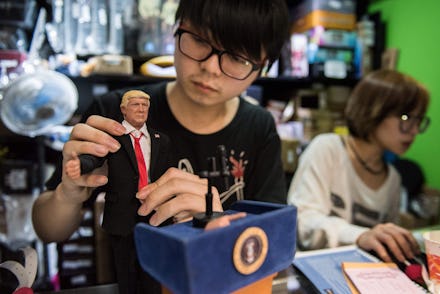China uses Trump "fake news" tactic to defend accusations of human rights violations

President Donald Trump's lexicon is going global. On Friday, the Chinese government appropriated Trump's tactic of dismissing damning media reports as "fake news."
Chinese state media outlet People's Daily responded with a tweet — that could have been written by Trump himself — to allegations the government violated human rights by torturing human rights lawyer Xie Yang.
"Foreign media reports that police tortured a detained lawyer is FAKE NEWS, fabricated to tarnish China's image," the tweet read, accompanied by a jolly-looking Xie.
The Twitter account for the State Council Information Office of the People's Republic of China echoed People's Daily's sentiment, describing the torture allegations as "imagination and prejudice-based."
But contrary to his smiling picture, Xie recounted harrowing stories of torture, according to transcripts of conversations with his lawyers, who made them public in January as part of their campaign to free him.
Xie was arrested in July 2015 in Hongjiang for subversion and related offenses during a government crackdown on civil rights lawyers and activists — he still awaits trial.
After being detained, he was shackled to a chair and interrogated, Xie's transcripts reveal, according to the Guardian. On his second day, Xie attests he was told "your only right is to obey" and was transferred to a secret prison.
Another official allegedly said, "We'll torture you to death just like an ant," while beating, interrogating and torturing Xie.
"I'm going to torment you until you go insane," another official reportedly told him. "Don't even imagine that you'll be able to walk out of here and continue being a lawyer. You're going to be a cripple." At one point, officials threatened to kill Xie and assured him they would leave no evidence, should they decide to.
Trump's efforts to suppress the media is of great concern, previously describing the press as "the enemy of the American people." But it appears to have opened a door for countries, such as China — with well-documented human rights violations and a history of lying to the media and quashing free press — to use the American government's strategy as a carte blanche. (Chinese authorities once blamed the death of a 24-year-old detainee on a game of "hide and seek," according to Human Rights Watch .)
Given the source of this strategy, specialists are concerned that by setting the example, it prohibits the United States from being able to say or do anything.
"Trump's attacks on the media will offer a good excuse for Chinese officials to step up their criticism of Western democracy and press freedom," journalism professor Qiao Mu at Beijing Foreign Studies University told the New York Times. "China can turn to Trump's attacks to say Western democracy is hypocrisy."